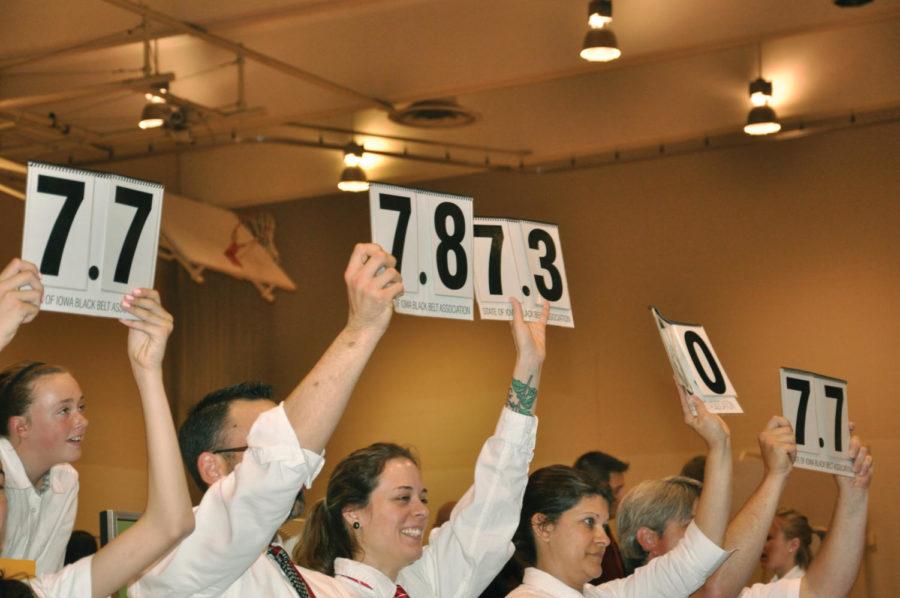Taekwondo tournament yields awards, experience for ISU students
May 25, 2011
Several ISU students came away from the 9th annual Iowa Governor’s Cup Taekwondo Championships with medals Saturday. Awardees ranged in rank from white belt to fourth-degree black belt. All competed in the 18 to 32-year-old age bracket.
Matt Hamann, graduate in education, received 2nd place in forms among male black belts holding a rank of third degree or higher. Matt Koresh placed 3rd among male blue belts for forms and 3rd in blue belt free sparring. Jarret Cook, graduate in natural resource ecology and management, received 3rd place among male white belts for both forms and free sparring.
Awards other students won could not be confirmed by organizers as of press time.
Held on the lower level of Forker Hall, the tournament brought together martial artists from all over the Midwest. ISU alumnus and competition judge Wes Grieme said that the tournament had drawn competitors from Illinois, Kansas, Nebraska, South Dakota, Michigan and Minnesota.
Iowa studios represented at the tournament included Bruce Taekwondo Academy of Cedar Rapids, Farrell’s of Des Moines, Kang’s Martial Arts of Coralville and Jung’s Taekwondo Academy of Cedar Rapids.
Master Yong Chin Pak, senior lecturer in kinesiology and president of the National Collegiate Taekwondo Association, said that 175 competitors had pre-registered for the tournament and estimated that 20 to 30 more had registered the morning of competition He set the number of spectators between 300 and 400. Youths, he noted, outnumbered adult participants by roughly a two-to-one margin.
Pak attributed the relatively low proportion of ISU students at the competition to the fact that many had gone home for the summer.
After an introductory address by Master Pak and the presentation of awards to several Taekwondo masters, the tournament began. Competitors executed rote patterns of movement called ‘forms’ first.
While executing their forms, competitors were judged on their speed, balance and power, as well as the fluidity with which they moved. A panel of five judges scored their performances on a 1 to 10 scale. The highest and lowest scores given were thrown out.
Grouped by age and rank, students competed in four different rings. The tournament was organized to allow the youngest, lowest-ranked students to go first. Going in ascending order, older and higher-ranked students took the rings after them. The forms portion of the competition culminated with the adult black belts competing against each other.
The forms portion of the tournament ended slightly past noon. Over the noon hour, as competitors and spectators ate lunch, students gave board-breaking demonstrations.
When competition resumed, participants turned from forms to sparring. Non-black belts sparred for two rounds lasting one minute each; black belts sparred for two rounds lasting two minutes each. Competitors were awarded points for landing blows, receiving two points for each blow to the head and one point for each blow to the body. Each blow that resulted in a knockdown earned competitors an additional point. Rounds were stopped early if competitors got seven points ahead of their opponents, or earned 12 total points.
While some ISU students competed, others assumed different roles at the tournament. Randy Benedict, a black belt and graduate in chemistry, served as a judge. Though he acknowledged the importance of his role, he said Taekwondo was about more than who won or lost a given competition.
“We do try to practice the tenets of martial arts,” Benedict said. “We don’t just throw those out the window.”
The tenets to which Benedict referred are Courtesy, Integrity, Self-Control, Indomitable Spirit and Perseverance — all qualities he said Taekwondo helped to cultivate.
Laura Funk, ISU Taekwondo Club co-president, black belt-decide and senior in agricultural biochemistry, refereed sparring matches at the tournament. She said she saw her role as especially crucial for ensuring that younger participants had a “fair experience.”
All Iowa Governor’s Cup competitors paid a $5 fee to participate in the event. Pak said the money raised, which totaled more than $1000, would go to the Red Cross’s disaster relief efforts.







